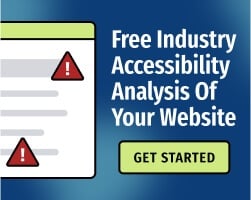As we turn our collective calendar pages over to March, Developmental Disabilities Awareness Month, we here at the Bureau of Internet Accessibility (BoIA) couldn’t help but think back to some milestones in history that were implemented to help right the social equality of people living with disabilities.
26 years ago, in 1990, workplace discrimination was at the forefront and was no longer going to be tolerated with the passing of the Americans with Disabilities Act (ADA). That same year marked the rebirth of a 1970’s legislature, the All Handicapped Children Act (EHA), into the more updated IDEA (Individuals with Disabilities Education Act), a law that ensures services to children with disabilities nationwide.
On a similar front and a topic that BoIA works directly toward advancing, is digital accessibility which falls under the ADA and exists to ensure that digital media, for example a website, is accessible to all people, including those who use assistive technology such as screen readers. However, digital accessibility does not seem to be a priority for many, as has become increasingly clear. The reality is that official enforcement of website accessibility standards has yet again been postponed, which only shines a brighter light on the work that still needs to be done in this space.
So, while there has been some forward momentum over the years toward the equality of people living with disabilities, there have certainly been some disappointing failures as well, and not just in the postponement of the enforcement of digital accessibility. According to reports released by the Bureau of Labor Statistics in 2014, the unemployment rate of people with disabilities is roughly 110% more than that of those without any disability.
“There is growing recognition that people with disabilities can make valuable contributions to organizations. And, there are many organizations that have made accommodations not only for compliance, but to leverage this valuable source of talent,” states Mark L. Lengnick-Hall, Professor of Management at the College of Business at University of Texas at San Antonio. “However, simple accessibility remains an issue that continues to create barriers. Progress has been made, but there is still a long way to go.

